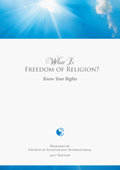The freedom “to have or to adopt” a religion or belief includes the freedom to choose a religion or belief, replace one’s current religion or belief with another, or to adopt atheistic views, as well as the right to retain one’s religion or belief. Article 18 of the International Covenant on Civil and Political Rights bars coercion that would impair the right to have or adopt a religion or belief, including the use of threats, violence and penal or economic sanctions to compel believers to adhere to their religious beliefs and congregations, to recant their religion or belief, or to convert. Policies or practices of coercion restricting access to education, medical care, employment, service contracts or public service through the use of mandatory declarations or statements denying association with a religion or belief similarly contravene human rights. [21]
The Second Vatican Council, after careful consultation with other faiths, summarized and restated many of these themes of religious freedom and tolerance in Dignitatis Humanae, including the teaching of this declaration regarding freedom from religious coercion:
The human person has a right to religious freedom. This freedom means that all men are to be immune from coercion on the part of individuals or of social groups or of any human power, in such wise that no one is to be forced to act in a manner contrary to his own beliefs, whether privately or publicly, whether alone or in association with others, within due limits. This right of the human person to religious freedom is to be recognized in the constitutional law whereby society is governed and thus it is to become a civil right. [22]




























